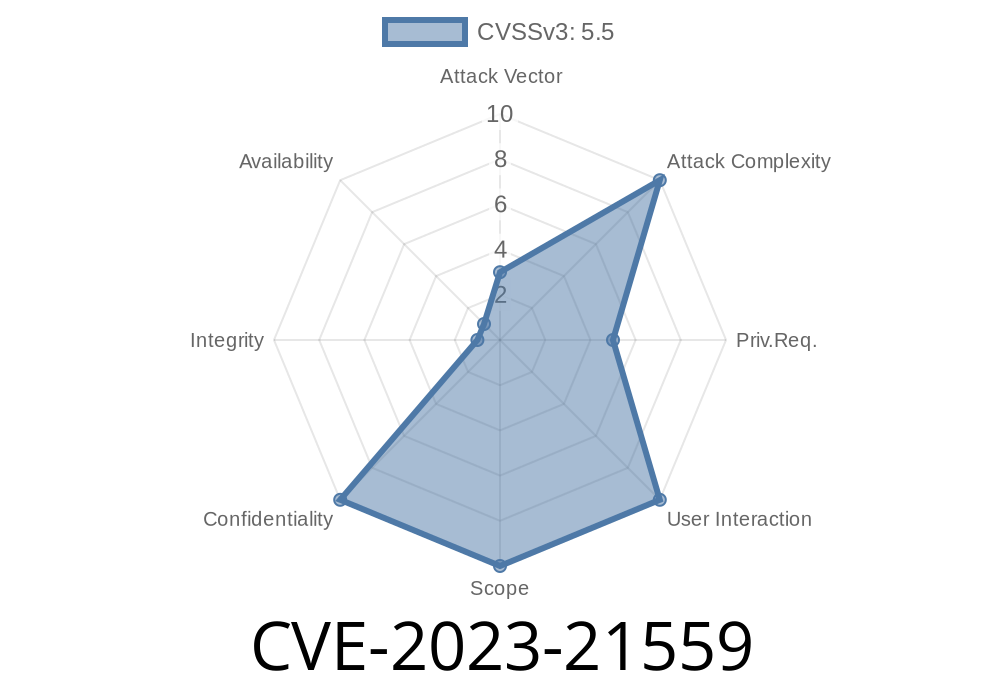In early 2023, Microsoft fixed a serious security issue identified as CVE-2023-21559. This vulnerability affected the cryptographic service of Windows—software code that’s supposed to protect your secrets. Here, we’ll explain what happened, how attackers could exploit it, and what you should do to keep safe. We’ll also provide code snippets and links to reliable references for anyone wanting to dig deeper.
What is CVE-2023-21559?
CVE-2023-21559 refers specifically to a flaw in the Windows CryptoAPI. This API is responsible for encrypting and decrypting sensitive information, such as passwords, certificates, and digital signatures. According to Microsoft's own security advisory, an attacker who successfully exploited this vulnerability could obtain information that should have remained private.
> 🟡 Important: This vulnerability is different from the similarly-numbered CVE-2023-21540 and CVE-2023-21550.
Windows Server 2016 and newer
If your computer is running any of these Windows versions *before* the January 2023 Patch Tuesday update, you might be vulnerable.
Technical Details: How Does the Vulnerability Work?
CVE-2023-21559 is an "information disclosure" vulnerability. It allows attackers to pull sensitive data from memory where cryptographic operations happen.
The Bug
When the Windows CryptoAPI handled certain cryptographic requests, it incorrectly exposed memory containing cryptographic secrets, like:
Session data
If an attacker had local access (either as a user or via malicious code), they could read parts of this memory—not supposed to be visible—from other process contexts.
Sample Attack Scenario
Suppose you have an encrypted file or a protected login password. If a hacker could run a program with low privileges on your PC, they might use this bug to spy on the cryptographic engine’s sensitive memory and collect bits needed to compromise your security.
PoC Code Snippet
Here’s a simplified demonstration—*educational use only!*—showing how a process might use Windows API calls to read cryptographic memory. (A real attack would be more complex and tailored to the nature of the leakage.)
#include <Windows.h>
#include <stdio.h>
int main() {
HANDLE hProcess = OpenProcess(PROCESS_VM_READ | PROCESS_QUERY_INFORMATION, FALSE, <TARGET_PID>);
if (!hProcess) {
printf("Failed to open process.\n");
return 1;
}
SIZE_T bytesRead;
BYTE buffer[256]; // Adjust size as needed
LPCVOID address = (LPCVOID)<MEMORY_ADDRESS>;
if (ReadProcessMemory(hProcess, address, buffer, sizeof(buffer), &bytesRead)) {
printf("Read %d bytes: \n", (int)bytesRead);
for (int i = ; i < bytesRead; i++)
printf("%02X ", buffer[i]);
printf("\n");
} else {
printf("Failed to read memory.\n");
}
CloseHandle(hProcess);
return ;
}
*Replace <TARGET_PID> with the target process ID and <MEMORY_ADDRESS> with the suspected address of the sensitive data block.*
How Attackers Might Use This
- Privilege escalation: Harvesting cryptographic secrets to move from a lower to a higher-privilege account.
Mitigation: How to Protect Yourself
The good news: Microsoft has released a patch as part of the January 2023 security updates. Here’s what you should do:
Install the latest Windows security updates.
Restrict Local Access
Don’t allow untrusted users or programs on your system. Remote attacks are unlikely, but local code execution is dangerous in this case.
Monitor Sensitive Keys and Files
If you suspect compromise, regenerate cryptographic keys and change passwords that might be affected.
References and Additional Reading
- Official CVE Record: NVD - CVE-2023-21559
- Microsoft Patch Details: MSRC Advisory
- Security Research: Windows Cryptography Flaws
- Patch Tuesday Recap (KrebsOnSecurity): January 2023 Patch Tuesday
Conclusion
CVE-2023-21559 underlines why cryptographic software needs near-perfect caution. Mistakes, even small ones, can result in private information leaking to an attacker with local access. Always keep your systems updated, limit untrusted code, and follow Microsoft’s security advisories.
Timeline
Published on: 01/10/2023 22:15:00 UTC
Last modified on: 01/17/2023 18:01:00 UTC
